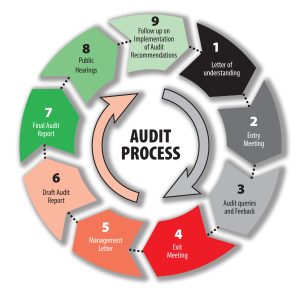

AS the audit landscape in Zimbabwe continues to evolve, the integration of artificial intelligence (AI) is fundamentally transforming traditional practices and redefining how auditors approach their work.
One of the most significant advancements in this domain is AI-driven intelligent sampling, a method that empowers auditors to select samples that more effectively reveal errors and anomalies. This innovative approach not only enhances compliance but also improves operational efficiency, resulting in audits that are more robust and reliable.
Intelligent sampling employs advanced algorithms and sophisticated data analytics to identify and select samples based on predefined criteria, as opposed to relying on arbitrary random selection methods. This targeted approach allows auditors to concentrate their efforts on areas with a higher propensity for errors, thereby significantly increasing the precision of their testing processes. According to the International Standards on Auditing (ISA 530), effective sampling techniques are essential for obtaining sufficient and appropriate audit evidence. Intelligent sampling aligns seamlessly with this standard, offering a more strategic method for evidence collection that enhances the overall audit quality.
AI-driven intelligent sampling enhances both compliance and operational efficiency by enabling auditors to select samples that are more representative of potential risks. Given Zimbabwe’s diverse business operations, this approach is particularly relevant, as it allows auditors to tailor their strategies to the unique contexts of their clients. This adaptability is crucial in a country where operational complexities can vary significantly across industries.

By concentrating on higher-risk areas and utilising targeted sampling techniques, auditors can not only bolster the reliability of their findings but also streamline the audit process. This efficiency allows auditors to allocate their time and resources more effectively, ultimately leading to more comprehensive and insightful audit outcomes. As noted in ISA 200, “Overall Objectives of the Independent Auditor and the Conduct of an Audit in Accordance with International Standards on Auditing,” the auditor’s objective is to obtain reasonable assurance that financial statements are free from material misstatement, and intelligent sampling significantly contributes to achieving this goal.
AI is a pivotal contributor to recent technological innovations, yet its application in auditing remains in a developmental phase. While AI is widely recognised in emerging fields such as autonomous vehicles, its integration into financial audits offers tremendous potential for enhancement. AI technologies bolster audits by increasing efficiency, effectiveness, and accuracy. The financial audit process has remained relatively stagnant since the implementation of regulations like the Sarbanes-Oxley Act of 2002. Intelligent sampling powered by AI represents a paradigm shift away from traditional methods, facilitating deeper analysis and information processing that were previously unattainable.
The foundation of intelligent sampling is built upon robust data analytics. By meticulously analysing historical data, auditors can identify trends and patterns that may indicate potential risks. This analytical capability allows for the development of tailored sampling strategies that reflect the specific operational realities of each client. For instance, if historical audits reveal a recurring issue in a particular revenue stream, auditors can prioritise samples from that area, ensuring a more effective and focused audit process. This practice is consistent with the principles outlined in ISA 315, which emphasises understanding the entity and its environment to identify and assess risks of material misstatement.
In Zimbabwe, where businesses operate under varying levels of complexity and regulatory scrutiny, the flexibility of intelligent sampling is invaluable. Auditors can customise their sampling methodologies based on client needs, ensuring relevance and accuracy. This adaptability not only enhances the quality of the audit but also fosters stronger relationships between auditors and clients, as customised approaches demonstrate a commitment to understanding the unique challenges each business faces.
Moreover, the implementation of AI-driven intelligent sampling can lead to significant cost savings and resource optimisation, enabling firms to allocate human capital more effectively. As articulated in ISA 600, “Special Considerations—Audits of Group Financial Statements (Including the Work of Component Auditors),” the application of intelligent sampling can streamline the audit process, especially in multi-entity environments where diverse operations necessitate a tailored approach.
As AI technology continues to advance, the adoption of intelligent sampling in auditing is poised for substantial growth. The potential for improved accuracy in identifying errors and inefficiencies will motivate auditors to embrace this innovative approach.
T he benefits extend beyond mere compliance; they foster a culture of continuous improvement within organisations, as identified issues can lead to actionable insights and enhancements in internal controls.
he benefits extend beyond mere compliance; they foster a culture of continuous improvement within organisations, as identified issues can lead to actionable insights and enhancements in internal controls.
Furthermore, the integration of intelligent sampling aligns with the objectives set forth in ISA 240, which focuses on the auditor’s responsibilities relating to fraud in an audit of financial statements. By leveraging AI to detect anomalies and patterns indicative of fraud, auditors can significantly enhance their risk assessment processes.
New era in auditing
Intelligent sampling represents a significant advancement in the auditing profession, particularly within Zimbabwe’s evolving landscape. By harnessing the power of AI and data analytics, auditors can enhance precision in testing, improve compliance, and streamline operations. As the profession adapts to these advancements, the integration of intelligent sampling will undoubtedly become a critical component of effective auditing practices.
The question remains: Are Zimbabwean auditors ready to embrace this new era of intelligent sampling? By adopting innovative techniques and leveraging technology, auditors can enhance their effectiveness and contribute to a more transparent and accountable business environment. As the landscape continues to evolve, the future of auditing in Zimbabwe looks promising, with intelligent sampling leading the way in precision and reliability. The call to action is clear: audit professionals must evolve alongside these technological advancements to ensure they remain at the forefront of the industry, committed to delivering high-quality audits that meet the needs of their clients and stakeholders. By Jackson T Mashinge
l Mashinge has over 13 years of experience in accounting, auditing, and finance. His expertise is in auditing, risk advisory, strategy formulation, project assurance, monitoring and evaluation, and enterprise risk management.